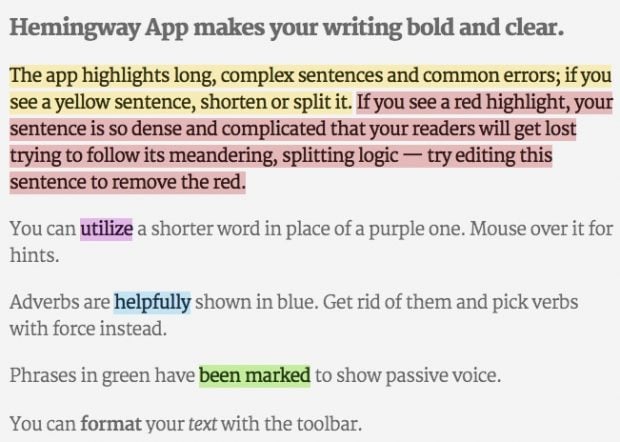For content marketers, writing is obviously an integral component to most, if not all, aspects of the job. Everything from drafting blog posts to crafting the perfect video script requires the ability to write. While of course the act of stringing words together to form sentences can satisfy the basic requirements, writing is a skill that with time, dedication, and a desire to improve, can be mastered to an exceptional level. Just like the perfect set of graphite pencils helps with drawing, there are numerous tools available to help you improve your chances of writing success. The following resources will help those of you who don’t consider yourselves writers (yet!) create enviable content that just begs to be shared.
Book it
An integral part of the writing process is inspiration, and the top source of inspiration for any writer is reading. As Stephen King said, “If you want to be a writer, you must do two things above all others: read a lot and write a lot.” Just as you schedule yourself time for other career development and education purposes, make room in your calendar for the time to read. As content strategist Mike Hanski shares in his Huffington Post article,reading can help you become a better writer. When you read you:
- Find inspiration
- Gain new knowledge
- Learn your genre better
- Expand your vocabulary for your own works
- Understand language better
- Learn from real gurus of writing
- Reveal the secrets of this job in practice
Two books that I have personally found not only to help the technical aspects of my writing, but which have breathed new life into my passion for the craft, are:
Everybody Writes
If you are in content marketing, Ann Handley’s Everybody Writes is a must-read. With every sentence in this writing guide worthy of repetition and consideration, Handley provides a thorough and approachable guide that proves that yes, everybody can write. She nails it on the head for content marketers who insist they can’t write with thefollowing passage:
“Good writing can be learned—the way trigonometry or algebra or balancing a balance sheet is a skill most of us can master. In an essay at the Neiman Journalism Lab, ‘How I Faced My Fears and Learned to Be Good at Math,’ Matt Waite writes: ‘The difference between good at math and bad at math is hard work. It’s trying. It’s trying hard. It’s trying harder than you’ve ever tried before. That’s it.’”
Bird by Bird
Whether writing a blog post on social media strategy, or the great american novel, Anne Lamott’s Bird by Bird provides a narrative on the writing process from beginning to end. One of the biggest assets of any content marketer is creativity, and Lamott offers insight into ways anybody, natural born writer or not, can foster this into their writing.Lamott declares that “writing is nothing more nor less than a sensemaking mechanism for life,” which most likely relates to the core principles of your content marketing strategy. You aim for clear, easily digestible, but memorable writing, and Bird by Birdwill help guide you along this path.
Blog busters
It’s safe to say that one of the key parts of your content marketing strategy is most likely a blog. As Social Media Examiner declares, “Blogs are your home base; they are the center of your content marketing system. Whether you’re a small business or a Fortune 100 company, blogs should be at the heart of your content marketing because blogsfuel social media, search optimization, and the sales process.”
However, blogging obviously requires a certain level of writing prowess, so if you consider yourself a non-writer you might feel like you need some help in creating quality content. Thankfully, the following resources are available to guide you through the blog writing process painlessly.
Portent’s Content Idea Generator
The first step in writing a blog post is, of course, coming up with a topic to write about. While reading, brainstorms, and other organization’s content can act as great inspiration for your ideas, if you feel that your genius well has temporarily dried up, Portent’s Content Idea Generator can be a saviour. Simply enter the subject you want to write about (such as “social media”) and click the arrow submit button. This will generate ideas for blog topics, and even if none of the suggestions are exactly what you are looking for, they will offer a solid jumping off point for your writing.
Copyblogger
Called “the bible of content marketing” by VentureBeat, Copyblogger is a high-quality site that all content marketers should have bookmarked. The Copyblogger blog provides advice and guidance from top experts in the field of content marketing, which has helped them gain the title as “the most popular content marketing and writing blog on the planet.” The editors lay it out by sharing what their readers can expect from Copyblogger by understanding that:
- It’s not (just) about SEO.
- It’s not (just) about social media.
- It’s not (just) about blogging or email marketing or conversion.
“Today, it’s always a bigger picture. You need to understand all the facets of effective content marketing, and we cover the gamut, daily… for free.”
Some of our favourite posts from Copyblogger, which will help non-writers master the craft, include:
- How to immediately become a more productive (and better) writer
- Why you should always write your headline first
- The #1 conversion killer in your copy (and how to beat it)
- 10 ways to build authority as an online writer
- The amazingly simple anatomy of a meaningful marketing story
- The prepared writer’s process for creating excellent content everyday
- Master this copywriting formula to dominate any social media platform
Content Marketing Institute
The Content Marketing Institute is a comprehensive resource for all social media specialists and content marketers. The site offers tons of resources such as: career advice, research areas, event listings, training resources, a magazine, podcast, and consulting services. Looking under the “content creation” tag, you’ll find numerous articles and posts from content marketing experts offering guides on writing and general content creation. Here are a few of our favorite posts from this section of the site, but you’ll easily find countless other resources by exploring the site yourself:
- 8+ tips to create a great script for successful videos
- Improve your email content with a 7 minute workout routine
- 7 things world-class bloggers do to improve their content marketing efforts
- Why strong writing is a skill to prioritize in 2016
- Content creation: 3 steps to great marketing writing
Crew
Crew matches creatives, designers, and developers with high quality companies that require their services. As a destination for so many within the realm of content marketing, the Crew blog offers a wealth of information for such professionals. The post that solidified Crew’s position on this list is one of their most famous, entitled Write ugly: How to write 20 posts in 2 days.
This post is especially groundbreaking for those who don’t consider themselves writers, as it emphasizes the practice of writing fast, and with mistakes. Author Jory Mackay focuses on the free-writing approach as a way for writers and “non-writers” to crack through whatever is holding them back from getting words down on paper. As Mackay explains, the key principles here are:
- Just start working (and don’t stop)
- Set out a block of time to work
- Write how you think
- Follow your thoughts
In addition to this key post, Crew has a number of posts in their repertoire that will undoubtedly contribute to your writing success:
- 4 daily habits that will boost creativity
- Write your way to a better life: Why writing is for everyone
- Beyond words: How to write for readability
- 7 tricks to help you work through a creative block
Hemingway App
Hemingway App is one that I’ve discussed before, but which deserves another mention. This free tool allows you to copy and paste in a block of text, which will be evaluated in its readability. As explained on the site, “Hemingway makes your writing bold and clear.It’s like a spellchecker, but for style. It makes sure that your reader will focus on your message, not your prose.” As all content marketers definitely aim for the focus to be on the message rather than the construction of said message, the Hemingway App is an invaluable tool.

CoSchedule’s Headline Analyzer
One of the most significant components of any piece of writing is the title or headline. Unfortunately, it can also one of the most difficult parts of the writing process. While eight out of 10 people will read a headline, only two out of those 10 will continue reading the actual article. Due to this, you want to ensure your headline is working for you, rather than against you, and CoSchedule’s Headline Analyzer can help you do just that. To find out if your headline makes the cut, you just need to enter it in the submission box and the Headline Analyzer will give you a score based on quality, SEO, social shareability, and increased traffic potential.

Now that you have all of these resources at your fingertips, it’s time to confidently put these fingers to keyboard and write on!